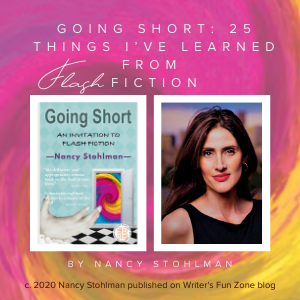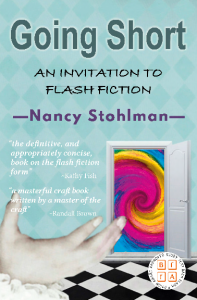Going Short: 25 Things I’ve Learned from Flash Fiction by Nancy Stohlman
About Flash Fiction from expert and writer, Nancy Stohlman.
***
 You could call me a flash aficionado.
You could call me a flash aficionado.
In the last dozen years I’ve: co-founded a flash fiction press, started a flash fiction reading series, launched flash fiction retreats, started the FlashNano challenge, judged flash contests, spoken on flash panels, featured at flash readings, taught at flash festivals, published four flash fiction books, three anthologies, hundreds of stories, and Going Short: An Invitation to Flash Fiction.
And for my next trick, I will now tell you everything I’ve learned about flash fiction
In Under 500 words:
- A lot people don’t know what flash fiction is. Like basically nobody. So be prepared to explain it: 1,000 words or less, telling a complete story. A lot.
- Just because it’s short doesn’t mean its flash fiction.
- Prose poetry is not (necessarily) flash fiction. See #2. Prose poetry is poetry using sentences. Prose poetry might be telling a story, but it might not.
- Flash fiction has to be telling a story.
- Not every story makes good flash. Some stories might make better poems, or novels, or plays.
- Flash fiction not always fiction. Fiction isn’t always fiction, either.
- You can say it in half as many words. Even if you think you can’t.
- Smaller is harder. Anyone who has attempted the 250-word scholarship essay over the 1,000-word essay because they “thought it was easier” will know what I’m talking about.
- The longer you write, the shorter your stories will get.
- Flash fiction is not for short attention spans. People with short attention spans are not looking for complex, nuanced, literature.
- Flash fiction requires a different sort of lens—you must cultivate “flash mind.”
- Flash fiction writers embrace risk, innovation and experimentation. Creativity bulges against a constraint.
- Whittling down a longer piece to “make it flash” rarely works.
- One rose in a vase is more interesting than 100 roses shoved in a vase.
- Flash makes you good at endings. You are going from beginning to ending in one sitting, so there’s no hiding it.
- Flash makes you good at titles. You get really strategic about how to re-envision your first impression.
- When in doubt, write it over. This is good for all writing but especially good for flash fiction.
- Flash fiction will make you more discerning. When I’m reading a novel, or watching a movie, I see what is fluffy and indulgent.
- You can apply the skills of flash to other genres: flash memoir, historical flash, flash noir, flash novel—in 2013 I wrote a flash opera.
- I never read flash before bed—it keeps me awake. It’s also hard to read a lot of flash in a row: each story is so dense you need to digest it.
- Flash is great at readings. No set up, no rambling, no excerpting, no explaining—the flash fiction story can be told in its entirely in under 5 minutes.
- Flash in good in classrooms. You are able to look at the entire story from beginning to end in one sitting.
- Good flash often makes your reader wish it was longer—and that’s okay. I mean, I wish Pulp Fiction was longer, too (sort of).
- You don’t have to be a flash fiction writer to cultivate the skills of flash. You will become a better writer regardless.
- Because small is exquisite. And if you have fallen in love with flash, you already know that.
ABOUT GOING SHORT: AN INVITATION TO FLASH FICTION
An inspiration to flash fiction lovers, and a valuable asset to those teaching the craft.
“The definitive, and appropriately concise book on the flash fiction form” — Writer and Teacher Kathy Fish
An inspiration to flash fiction lovers, and a valuable asset to those teaching the craft.
Flash fiction is changing the way we tell stories. Carving away the excess, eliminating all but the most essential, flash fiction is putting the story through a literary dehydrator, leaving the meat without the fat. And it only looks easy.
In Going Short: An Invitation to Flash Fiction, veteran writer Nancy Stohlman takes us on a flash fiction journey: from creating, sculpting, revisioning and collecting stories to best practices for writers in any genre. It is both instructive and conversational, witty, and practical, and presented in flash fiction chapters that demonstrate the form as it is discussed.
Pre-Order Now through Ad Hoc Fiction or Amazon!
GOING SHORT | Ad Hoc Fiction: Master Class Series | October 15, 2020 | ISBN: 978-1-912095-79-7
***
MEET THE AUTHOR
 Nancy Stohlman is the author of four books of flash fiction including Madam Velvet’s Cabaret of Oddities (a finalist for a 2019 Colorado Book Award), The Vixen Scream and Other Bible Stories (2014), and The Monster Opera (2013). She is the creator of The Fbomb Flash Fiction Reading Series and FlashNano in November. Her work has been anthologized in the W.W. Norton New Micro: Exceptionally Short Fiction, Macmillan’s The Practice of Fiction, and the Best Small Fictions 2019. Her craft book, Going Short: An Invitation to Flash Fiction, is forthcoming from Ad Hoc Fiction in 2020. She teaches writing and rhetoric at the University of Colorado Boulder.
Nancy Stohlman is the author of four books of flash fiction including Madam Velvet’s Cabaret of Oddities (a finalist for a 2019 Colorado Book Award), The Vixen Scream and Other Bible Stories (2014), and The Monster Opera (2013). She is the creator of The Fbomb Flash Fiction Reading Series and FlashNano in November. Her work has been anthologized in the W.W. Norton New Micro: Exceptionally Short Fiction, Macmillan’s The Practice of Fiction, and the Best Small Fictions 2019. Her craft book, Going Short: An Invitation to Flash Fiction, is forthcoming from Ad Hoc Fiction in 2020. She teaches writing and rhetoric at the University of Colorado Boulder.
When she is not writing flash fiction she straps on stilettos and becomes the lead singer of the lounge metal jazz trio Kinky Mink. She dreams of one day becoming a pirate.
CONNECT ONLINE
WEBSITE: NancyStohlman.com
FACEBOOK: /nancy.stohlman
TWITTER: @nancystohlman
FLASH FICTION RETREATS: flashfictionretreats.com
FBOMB FLASH FICTION READING SERIES: Fbombdenver.com
CRAFT ARTICLES & THE WRITING LIFE
***
Want to read more articles like this one Writer’s Fun Zone? Subscribe here.
***
Get a free book designed to help you connect for the first time or re-connect with your playful side to generate ideas, write more, more often, and have fun doing so.







This is an excellent summary, mate, but I feel that you’ve left off what for me was one of the biggest drawcards of it: a sense of community. Especially if you participate in regular flash fiction comps where the entries are posted and you’re encouraged to comment on each other’s entries. Seeing the same names week after week/monthly/etc saying encouraging things and providing supportive critique gives a strong sense of camaraderie. And sometimes it gives you a pool of beta readers/editors/cover designers etc.
Of course! The flash community is extremely special.